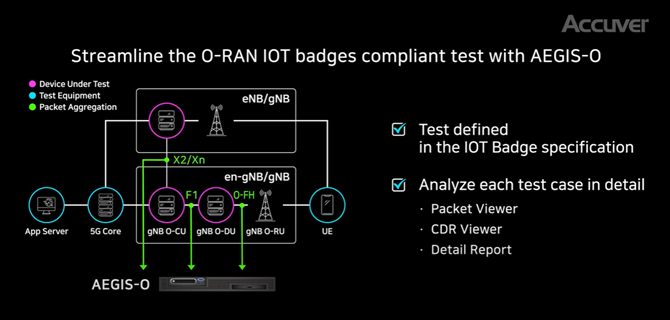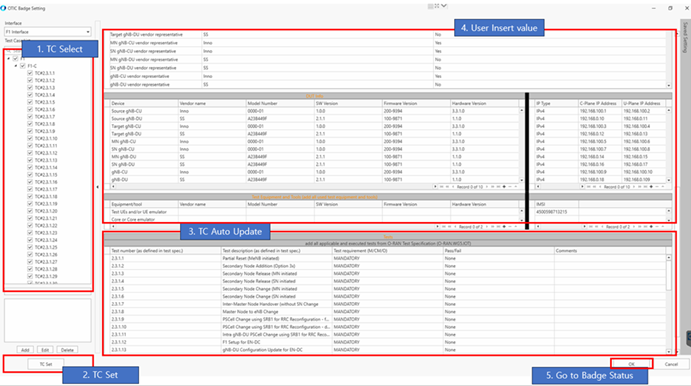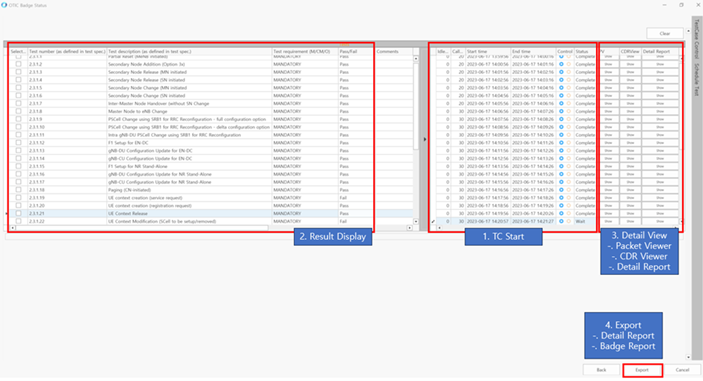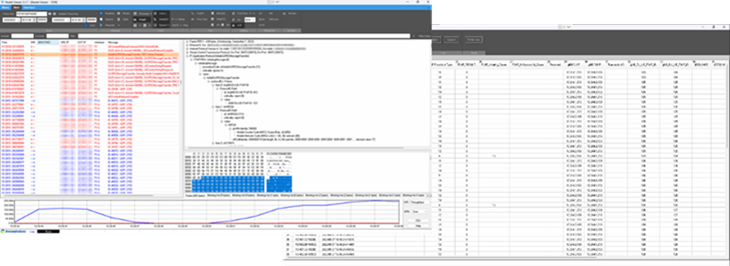
[O-RAN Certification and Badging Program]
The O-RAN certification and badging
program aims to minimize repetition of fundamental and common tests performed
to verify and validate O-RAN based products and solutions before their
deployment in operator networks. It defines and unifies processes,
procedures, templates, data format, etc. which are provided to ensure sharing
of the test results and repeatability of the executed tests.
Currently, the O-RAN certificates, IOT
badges and E2E badges have been defined for the following products (and
interfaces).
● O-RAN certificates for
- O-RU with Open Fronthaul interface (WG4)
- O-DU (or combined O-DU/O-CU) with Open
Fronthaul interface (WG4)
● O-RAN IOT badges for
- O-RU and O-DU (or combined O-DU/O-CU)
connected via Open Fronthaul interface(WG4)
- eNB and en-gNB connected via X2
interface(WG5)
- gNB-DU and gNB-CU connected via F1-C
interface(WG5)
- two gNBs connected via Xn-C interface (WG5)
● O-RAN E2E badges for
-O-RU, O-DU and O-CU (or their combinations) included in the E2E system or subsystem(TIFG)
The O-RAN certification and badging refers to
tests defined in O-RAN test specifications produced by related O-RAN Work/Focus
Groups. Through O-RAN certification and badging program, any O-RAN vendor
regardless of their size can have an opportunity to showcase their products and
solutions, improve interoperability, and ultimately increase vendor diversity
and supply chain resilience for operators embracing open RAN.
O-RAN certification and badging can improve
operator confidence in their chosen O-RAN based blueprint and can reduce the
complexity and duration of pre-deployment testing.
[AEGIS-O supports Automated Test and Report
Development for O-RAN IOT Badging(WG5)]
AEGIS-O introduces a new feature that
provides automated testing functionality for O-RAN IOT badges, encompassing all
test cases defined in the O-RAN Open F1/X2/Xn Interface, as outlined by the
Interoperability Test Specification of the O-RAN Alliance Working Group (WG5).
Operators can easily examine the compatibility of multi-vendor systems based on
the O-RAN Test Specification and precisely analyze interoperability problems.
Accuver (Innowireless) is an active member of
the O-RAN Alliance. AEGIS-O was developed to automatically perform and report
the same tests conducted by OTIC. Operators and vendors can independently
conduct the same level of interoperability tests as OTIC using AEGIS-O.
AEGIS-O not only executes tests defined in
the IOT Badge specification but also provides features to analyze each test
case in detail, such as the Packet Viewer, CDR Viewer, and Detail Report. Users
can access statistical information about all test cases and investigate each
test case for troubleshooting. This helps both operator and vendor communities
prepare for OTIC tests and ensures confidence in O-RAN based products and
solutions. Vendors can enhance interoperability and prepare for OTIC certification
tests by proactively preparing the test cases defined in the standard. By
conducting tests with AEGIS-O, operators can ensure interoperability at the
OTIC level when configuring systems with products from different vendors. This
reduces testing efforts for network operators and promotes vendors' O-RAN based
products and solutions, creating an opportunity for interoperability among
different vendors and gaining acceptance from others.

[AEGIS-O O-RAN IOT Badging( WG5) Test
Procedure]
AEGIS-O provides an automated testing feature
for eNB and gNB connected via the X2 interface, gNB-DU and gNB-CU connected via
the F1-C interface, and two gNBs connected via the Xn-C interface. It supports
all the test cases specified in the O-RAN Open F1/X2/Xn Interface Working Group
Interoperability Test Specification. In AEGIS-O, once the user selects the
interface and test case and initiates the test, the results are assessed
according to the criteria established within the O-RAN ALLIANCE framework.
AEGIS-O offers Badge Reports that present the test results, and users can
comprehensively investigate individual test cases using tools such as the
Packet Viewer, CDR Viewer, and Detail Report.
Midhaul traffic is tapped and flow into AEGSI-O by capture card and Packet Broker. When the user clicks WG5.IOT on the menu screen of AEGIS-O and selects the interface to be tested the Badge Setting screen is displayed.

On the Badge Setting
window, users can select test cases and configure profile information such as
DUT information and network profile, etc.

The Badge Status window shows the status of all scheduled test cases. Upon completion of each test case run, the test result is immediately displayed. Users have the option to save or submit results by exporting both the Badge Report and Detail Report. AEGIS-O’s Badge report form aligns with the O-RAN Alliance Badge program’s report structure, enabling vendors to prepare OTIC Tests, and allowing operators to easily compare it with other Badge reports.

Users can also
investigate packets and CDRs related to the particular test case if needed.

In AEGIS-O, O-RAN WG5.IOT automated tests
make it possible for operators to quickly and easily detect and analyze IOT
problems with a real-time packet analysis feature. This approach offers a
cost-effective way to verify the interoperability of operators' O-RAN systems,
which consist of products from multiple vendors.
References [1] Overview of Open Testing and
Integration Centre (OTIC) and O-RAN Certification and Badging Program: O-RAN
ALLIANCE Test and Integration Focus Group, White Paper, April 2023